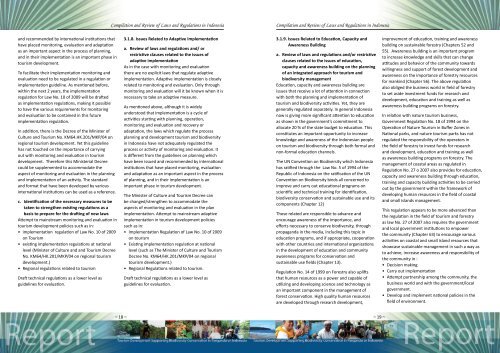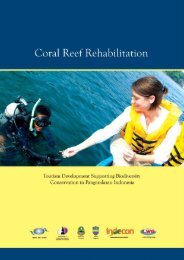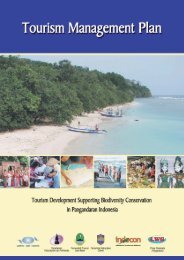Review of Laws and Regulation - unwto
Review of Laws and Regulation - unwto
Review of Laws and Regulation - unwto
- No tags were found...
You also want an ePaper? Increase the reach of your titles
YUMPU automatically turns print PDFs into web optimized ePapers that Google loves.
Compilation <strong>and</strong> <strong>Review</strong> <strong>of</strong> <strong>Laws</strong> <strong>and</strong> <strong>Regulation</strong>s in IndonesiaCompilation <strong>and</strong> <strong>Review</strong> <strong>of</strong> <strong>Laws</strong> <strong>and</strong> <strong>Regulation</strong>s in Indonesia<strong>and</strong> recommended by international institutions thathave placed monitoring, evaluation <strong>and</strong> adaptationas an important aspect in the process <strong>of</strong> planning,<strong>and</strong> in their implementation is an important phase intourism development.To facilitate their implementation monitoring <strong>and</strong>evaluation need to be regulated in a regulation orimplementation guideline. As mentioned before,within the next 2 years, the implementationregulation for Law No. 10 <strong>of</strong> 2009 will be draftedas implementation regulations, making it possibleto have the various requirements for monitoring<strong>and</strong> evaluation to be contained in this futureimplementation regulation.In addition, there is the Decree <strong>of</strong> the Minister <strong>of</strong>Culture <strong>and</strong> Tourism No. KM64.HK.201/MKP/04 onregional tourism development. Yet this guidelinehas not touched on the importance <strong>of</strong> carryingout with monitoring <strong>and</strong> evaluation in tourismdevelopment. Therefore this Ministerial Decreecould be supplemented to accommodate theaspect <strong>of</strong> monitoring <strong>and</strong> evaluation in the planning<strong>and</strong> implementation <strong>of</strong> an activity. The st<strong>and</strong>ard<strong>and</strong> format that have been developed by variousinternational institutions can be used as a reference.c. Identification <strong>of</strong> the necessary measures to betaken to strengthen existing regulations as abasis to prepare for the drafting <strong>of</strong> new lawsAttempt to mainstream monitoring <strong>and</strong> evaluation intourism development policies such as in:• implementation regulation <strong>of</strong> Law No. 10 <strong>of</strong> 2009on Tourism• existing implementation regulations at nationallevel (Minister <strong>of</strong> Culture <strong>and</strong> <strong>and</strong> Tourism DecreeNo. KM64/HK.201/MKP/04 on regional tourismdevelopment.)• Regional regulations related to tourismDraft technical regulations as a lower level asguidelines for evaluation.3.1.8. Issues Related to Adaptive Implementationa. <strong>Review</strong> <strong>of</strong> laws <strong>and</strong> regulations <strong>and</strong>/ orrestrictive clauses related to the issues <strong>of</strong>adaptive implementationAs in the case with monitoring <strong>and</strong> evaluationthere are no explicit laws that regulate adaptiveimplementation. Adaptive implementation is closelyrelated to monitoring <strong>and</strong> evaluation. Only throughmonitoring <strong>and</strong> evaluation will it be known when it isnecessary to take an adaptive measure.As mentioned above, although it is widelyunderstood that implementation is a cycle <strong>of</strong>activities starting with planning, operation,monitoring <strong>and</strong> evaluation <strong>and</strong> recovery oradaptation, the laws which regulate the processplanning <strong>and</strong> development tourism <strong>and</strong> biodiversityin Indonesia have not adequately regulated theprocess or activity <strong>of</strong> monitoring <strong>and</strong> evaluation. Itis different from the guidelines on planning whichhave been issued <strong>and</strong> recommended by internationalinstitutions that have placed monitoring, evaluation<strong>and</strong> adaptation as an important aspect in the process<strong>of</strong> planning, <strong>and</strong> in their implementation is animportant phase in tourism development.The Minister <strong>of</strong> Culture <strong>and</strong> Tourism Decree canbe changed/strengthen to accommodate theaspects <strong>of</strong> monitoring <strong>and</strong> evaluation in the planimplementation. Attempt to mainstream adaptiveimplementation in tourism development policiessuch as in:• Implementation <strong>Regulation</strong> <strong>of</strong> Law No. 10 <strong>of</strong> 2009on tourism• Existing implementation regulation at nationallevel (such as The Minister <strong>of</strong> Culture <strong>and</strong> TourismDecree No. KM64/HK.201/MKP/04 on regionaltourism development.)• Regional <strong>Regulation</strong>s related to tourism.Draft technical regulations as a lower level asguidelines for evaluation.3.1.9. Issues Related to Education, Capacity <strong>and</strong>Awareness Buildinga. <strong>Review</strong> <strong>of</strong> laws <strong>and</strong> regulations <strong>and</strong>/or restrictiveclauses related to the issues <strong>of</strong> education,capacity <strong>and</strong> awareness building on the planning<strong>of</strong> an integrated approach for tourism <strong>and</strong>biodiversity managementEducation, capacity <strong>and</strong> awareness building areissues that receive a lot <strong>of</strong> attention in connectionwith both the planning <strong>and</strong> implementation <strong>of</strong>tourism <strong>and</strong> biodiversity activities. Yet, they aregenerally regulated separately. In general Indonesianow is giving more significant attention to educationas shown in the government’s commitment toallocate 20 % <strong>of</strong> the state budget to education. Thisconstitutes an important opportunity to increaseknowledge <strong>and</strong> awareness <strong>of</strong> the Indonesian peopleon tourism <strong>and</strong> biodiversity through both formal <strong>and</strong>non-formal education channels.The UN Convention on Biodiversity which Indonesiahas ratified through the Law No. 5 <strong>of</strong> 1994 <strong>of</strong> theRepublic <strong>of</strong> Indonesia on the ratification <strong>of</strong> the UNConvention on Biodiversity binds all concerned toimprove <strong>and</strong> carry out educational programs onscientific <strong>and</strong> technical training for identification,biodiversity conservation <strong>and</strong> sustainable use <strong>and</strong> itscomponents (Chapter 12)Those related are responsible to advance <strong>and</strong>encourage awareness <strong>of</strong> the importance, <strong>and</strong>efforts necessary to conserve biodiversity, throughpropag<strong>and</strong>a in the media, including this topic ineducation programs, <strong>and</strong> if appropriate, cooperationwith other countries <strong>and</strong> international organizationsin the development <strong>of</strong> education <strong>and</strong> communityawareness programs for conservation <strong>and</strong>sustainable use fields (Chapter 13).<strong>Regulation</strong> No. 14 <strong>of</strong> 1999 on Forestry also upliftsthat human resources as a power <strong>and</strong> capable <strong>of</strong>utilizing <strong>and</strong> developing science <strong>and</strong> technology asan important component in the management <strong>of</strong>forest conservation. High quality human resourcesare developed through research development,improvement <strong>of</strong> education, training <strong>and</strong> awarenessbuilding on sustainable forestry (Chapters 52 <strong>and</strong>55). Awareness building is an important programto increase knowledge <strong>and</strong> skills that can changeattitudes <strong>and</strong> behavior <strong>of</strong> the community towardswillingness <strong>and</strong> support <strong>of</strong> forest development <strong>and</strong>awareness on the importance <strong>of</strong> forestry resourcesfor mankind (Chapter 56). The above regulationalso obliged the business world in field <strong>of</strong> forestryto set aside investment funds for research <strong>and</strong>development, education <strong>and</strong> training as well asawareness building programs on forestry.In relation with nature tourism business,Government <strong>Regulation</strong> No. 18 <strong>of</strong> 1994 on theOperation <strong>of</strong> Nature Tourism in Buffer Zones inNational parks, <strong>and</strong> nature tourism parks has notregulated the responsibility <strong>of</strong> the operators inthe field <strong>of</strong> forestry to invest funds for research<strong>and</strong> development, education <strong>and</strong> training as wellas awareness building programs on forestry. Themanagement <strong>of</strong> coastal areas as regulated in<strong>Regulation</strong> No. 27 o 2007 also provides for education,capacity <strong>and</strong> awareness building through education,training <strong>and</strong> capacity building activities to be carriedout by the government within the framework <strong>of</strong>developing human resources in the field <strong>of</strong> coastal<strong>and</strong> small isl<strong>and</strong>s management.This regulation appears to be more advanced thanthe regulation in the field <strong>of</strong> tourism <strong>and</strong> forestryas law No. 27 <strong>of</strong> 2007 also requires the government<strong>and</strong> local government institutions to empowerthe community (Chapter 63) to encourage variousactivities on coastal <strong>and</strong> small isl<strong>and</strong> resources thatshowcase sustainable management in such a way asto achieve, increase awareness <strong>and</strong> responsibility <strong>of</strong>the community in :• Decision making• Carry out implementation• Attempt partnership among the community, thebusiness world <strong>and</strong> with the government/localgovernment.• Develop <strong>and</strong> implement national policies in thefield <strong>of</strong> environment.~ 18 ~~ 19 ~




